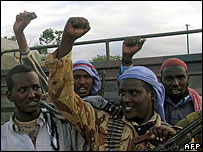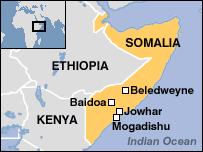![]()
BBC News
Friday, June 16, 2006
 The lightly-armed Islamic militias drove out the US-backed warlords |
In the past few days an alliance of Islamic militias – the Union of Islamic Courts (UIC) – has routed a loose alliance of US-backed warlords and seized control of the capital, Mogadishu as well as several other towns.
On Thursday, the militias pressed home their advantage, advancing northwards towards the Ethiopian border and the refuge of the weak transitional government in Baidoa.
Meanwhile, in New York the US State Department convened a crisis meeting of several countries to form a Somalia Contact Group in an effort to work out a solution to the country’s security problems.
Afghanistan revisited
After a brief gun battle, the lightly armed but well-motivated militias of the Union of Islamic Courts drove out the warlords from Jowhar just north of the capital and have since been consolidating their grip on the town.
After a brief gun battle, the lightly armed but well-motivated militias of the Union of Islamic Courts drove out the warlords from Jowhar just north of the capital and have since been consolidating their grip on the town.
Sean McCormack US State Department |
They’ve been quick to impose a curfew as well as Islamic Sharia law.
Surrounded by a crowd of enthusiastic locals, militia leader Sheikh Sharif Ahmed announced:
“We want to secure law and order then no one can take a gun inside Jowhar town except security people, and from today, from 8pm to 5am (1700-0200GMT), there is a curfew in town.”
The residents of Jowhar seem to be welcoming their newfound security.
A similar scenario was played out in Afghanistan 10 years ago when the Taliban swept away the anarchy and violence associated with that country’s own warlords.
US fears
But the US administration, which has long been worried about al-Qaeda cells sheltering in Somalia, is clearly troubled that by backing the unpopular Somali warlords, it appears to have backed the losing side.
The US State Department spokesman Sean McCormack told the BBC:
 |
“Nobody wants Somalia to become a safe haven – well, maybe there are some: those terrorists, but the international community does not want it to become a safe haven.”
Somalia is widely believed to have been the base for the cells that blew up the US embassies in Nairobi and Dar es Salaam simultaneously in 1998.
It is also believed to have been the source of the al-Qaeda attack on an Israeli-owned hotel near Mombasa and a failed attempt to shoot down a nearby Israeli airliner in 2002.
Policy backfires
In order to prevent al-Qaeda establishing itself in the region, the US set up base in neighbouring Djibouti in late 2002, as part of the Combined Joint Task Force: Horn of Africa (CJTF-HOA).
With nearly 2,000 troops based in an old French Foreign Legion camp, as well as naval and air patrols involving other western nations, Washington is trying to keep tabs on the region.
But the Pentagon is reluctant to return in force to Somalia after two of its helicopters were shot down by Somali gunmen and 18 US Rangers killed in 1993 in what became known as the Black Hawk Down incident.
Instead, the CIA has widely reported to have been secretly funding Somali warlords with cash since February, operating out of the US embassy in Nairobi and flying the money into remote Somali airstrips.
John Prendergast, who served on President Clinton’s National Security Council (NSC) and who now works for the International Crisis Group (ICG) says this policy has backfired.
“They’ve just picked a few warlords to pursue a very narrow military strategy of capturing al-Qaeda suspects and ignoring the context that they were swimming in. And the result is that we now have no access whatsoever to Mogadishu and the situation has gravely deteriorated.”
Today, America is not loved in Somalia.
But nor is al-Qaeda.
Washington and the West will have to find a way to deal with the new status quo there, or risk driving moderate Islamists into the arms of the very people they’re most afraid of.
Source: BBC, June 16, 2006






